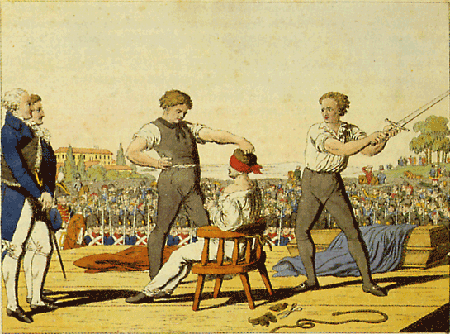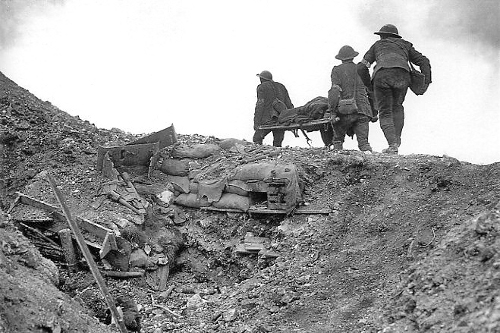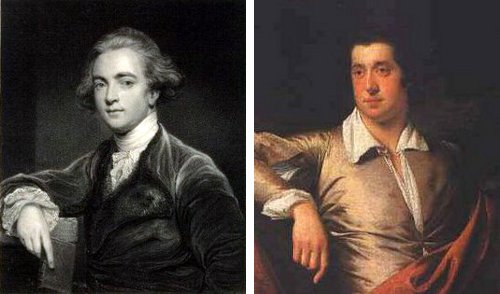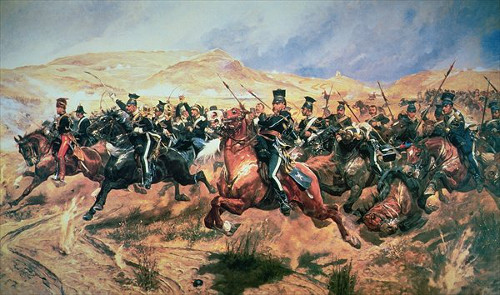
“I do not believe that any man fears to be dead, but only the stroke of death.” — Francis Bacon

“I do not believe that any man fears to be dead, but only the stroke of death.” — Francis Bacon
Miss Mildred West, whose duties on the Alton [Ill.] Evening Telegraph include the writing of obituaries, has been taking a week’s vacation. And, for the first time in the memory of her fellow workers on the newspaper, a week has passed with no deaths being reported in this city of 32,000. Normally, ten occur every week.
— New York Times, Sept. 1, 1946

Three nightmare glimpses of World War I:
The first experience I had of rotting bodies had been at Serre, where, as a battalion, we dealt with the best part of a thousand dead who came to pieces in our hands. As you lifted a body by its arms and legs they detached themselves from the torso, and this was not the worst thing. Each body was covered inches deep with a black fur of flies which flew up into your face, into your mouth, eyes and nostrils, as you approached. The bodies crawled with maggots. … We stopped every now and then to vomit. … The bodies had the consistency of Camembert cheese. I once fell and put my hand through the belly of a man. It was days before I got the smell out of my hands.
— British lieutenant Stuart Cloete on a burial party after the Somme, from his autobiography A Victorian Son
At the Epéhy crossroads, we found a huge cat squatting on the chest of a dead German, eating his face. It made us sick to see it, and I sent two men to chase it away. As they approached it sprang snarling at them, but they beat it down with their rifles and drove it into the ruined houses. Then we covered the body with a sack, and went on … [Later] we saw the sack we had thrown over the dead Jerry heaving up and down, and there was pretty pussy, still rending and tearing the body; so we shot it and continued our march to Longavesnes.
— From the diary of British lieutenant Edwin Vaughan of the Royal Warwickshire Regiment, April 1917
One evening, whilst on patrol, Jacques saw some rats running from under the dead men’s greatcoats, enormous rats, fat with human flesh. His heart pounding, he edged towards one of the bodies. Its helmet had rolled off. The man displayed a grimacing face, stripped of flesh; the skull bare, the eyes devoured. A set of false teeth slid down on to his rotting jacket, and from the yawning mouth leapt an unspeakably foul beast.
— A French soldier, quoted in John Ellis’ Eye-Deep in Hell, 1989
When a man dies
His portraits change.
His eyes look at you
Differently and his lips smile
A different smile. I noticed this
Returning from a poet’s funeral.
Since then I have seen it verified
Often and my theory is true.
— Anna Akhmatova, 1940
Let’s hope this isn’t true — Francis Joseph Baigent’s History of the Ancient Town and Manor of Basingstoke (1889) records the story of a woman who was buried alive twice. Baigent cites two sources, an undated tract from around 1675 and a book published in 1786, The Uncertainty of the Signs of Death. Mrs. Blunden, the wife of a local malt trader, was “a fat gross woman” who in July 1674 drank so much poppy-water (opium) that she fell into a deep sleep that arrested any apparent breath or pulse. The apothecary declared that he supposed she would never wake, and her husband left for London on business, directing that she be buried on his return. But the woman’s relatives noted that the weather was warm and that the body would not last four days, so they buried her on the following day, a Wednesday. Now the tract reads:
The Friday following toward the evening some of the Scholars of the Town being at play in the Churchyard near her grave, they fancied they heard a kind of hollow voice, as it were under ground, to which laying their ears and listening more attentively they plainly heard somebody say:
Take me out of my Grave,
which words the complaining voice repeated several times, intermixing them with fearful groans and dismal shriekings.
The boys reported this to several people but were dismissed. They returned to the chuchyard on Saturday and heard the voice again, “if not with so distinct yet with a louder accent,” and that afternoon the clerk finally exhumed Mrs. Blunden. “And now surveying her body, they found it most lamentably beaten, which they concluded to proceed from the violence she did herself in that deplorable an astonishment, but upon the most diligent scrutiny they could not apprehend that she had the least breath of life remaining, and therefore they again let her down into the grave, intending on the morrow to send to the Coroner.”
Guards were set to watch the resealed grave, but as the night was wet they abandoned their post, and “on the morrow morning at their return to the grave, they found she had torn off great part of her winding sheet, scratched herself first in several places, and beaten her mouth so long till it was all in gore blood.”
A number of citizens were indicted for their negligence, but a town doctor testified that he had held a mirror to Blunden’s mouth before her burial and could see no sign of breath, so “only the Town had a considerable fine set upon them for their neglect.”
On New Year’s Eve 1819, 33-year-old London tea dealer Elton Hamond committed suicide. A man found guilty of deliberate self-murder would forfeit his estate, so Hamond composed this plea:
To the Coroner and the Gentlemen who will sit on my Body.
Norwood, 31st December, 1819.
Gentlemen,
To the charge of self-murder I plead not guilty. For there is no guilt in what I have done. Self-murder is a contradiction in terms. If the King who retires from his throne is guilty of high treason; if the man who takes money out of his own coffers and spends it is a thief; if he who burns his own hayrick is guilty of arson; or he who scourges himself of assault and battery, then he who throws up his own life may be guilty of murder, — if not, not.
If anything is a man’s own, it is surely his life. Far, however, be it from me to say that a man may do as he pleases with his own. Of all that he has he is a steward. Kingdoms, money, harvests, are held in trust, and so, but I think less strictly, is life itself. Life is rather the stewardship than the talent. The King who resigns his crown to one less fit to rule is guilty, though not of high treason; the spendthrift is guilty, though not of theft; the wanton burner of his hayrick is guilty, though not of arson; the suicide who could have performed the duties of his station is perhaps guilty, though not of murder, not of felony. They are all guilty of neglect of duty, and all, except the suicide, of breach of trust. But I cannot perform the duties of my station. He who wastes his life in idleness is guilty of a breach of trust; he who puts an end to it resigns his trust, — a trust that was forced upon him, — a trust which I never accepted, and probably never would have accepted. Is this felony? I smile at the ridiculous supposition. How we came by the foolish law which considers suicide as felony I don’t know; I find no warrant for it in Philosophy or Scripture. It is worthy of the times when heresy and apostacy were capital offences; when offences were tried by battle, ordeal, or expurgation; when the fine for slaying a man was so many shillings, and that for slaying an ass a few more or less.
Every old institution will find its vindicators while it remains in practice. I am an enemy to all hasty reform, but so foolish a law as this should be put an end to. Does it become a jury to disregard it? For juries to disregard their oaths for the sake of justice is, as you probably know, a frequent practice. The law places them sometimes in the cruel predicament of having to choose between perjury and injustice: whether they do right to prefer perjury, as the less evil, I am not sure. I would rather be thrown naked into a hole in the road than that you should act against your consciences. But if you wish to acquit me, I cannot see that your calling my death accidental, or the effect of insanity, would be less criminal than a jury’s finding £10 Bank-of-England note worth thirty-nine shillings, or premeditated slaying in a duel simple manslaughter, both of which have been done. But should you think this too bold a course, is it less bold to find me guilty of being felo de se when I am not guilty at all, as there is no guilt in what I have done? I disdain to take advantage of my situation as culprit to mislead your understandings, but if you, in your consciences, think premeditated suicide no felony, will you, upon your oaths, convict me of felony? Let me suggest the following verdict, as combining liberal truth with justice: — ‘Died by his own hand, but not feloniously.’ If I have offended God, it is for God, not you, to enquire. Especial public duties I have none. If I have deserted any engagement in society, let the parties aggrieved consign my name to obloquy. I have for nearly seven years been disentangling myself from all my engagements, that I might at last be free to retire from life. I am free to-day, and avail myself of my liberty. I cannot be a good man, and prefer death to being a bad one, — as bad as I have been and as others are.
I take my leave of you and of my country condemning you all, yet with true honest love. What man, alive to virtue, can bear the ways of the best of you? Not I, you are wrong altogether. If a new and better light appears, seek it; in the meantime, look out for it. God bless you all!
Hamond left the letter with his friend Henry Crabb Robinson: “Mind you don’t get yourself into a scrape by making an over-zealous speech if you attend as my counsel. You may say throughout, ‘The culprit’s defence is this.'” Robinson, fearing a scandal, passed it unread to Hamond’s relations, and the jury found Hamond insane.
“To himself every one is an immortal: he may know that he is going to die, but he can never know that he is dead.” — Samuel Butler

Once, at the chambers of Sir William Jones, while some books were being removed, a large spider dropped upon the floor and Sir William said to Mr. Day, the philanthropist, who stood near him, ‘Kill that spider, Day; kill that spider!’ ‘No,’ said Mr. Day, with that coolness for which he was so conspicuous, ‘I will not kill that spider, Jones; I do not know that I have a right to kill that spider! Suppose when you are going in your coach to Westminster Hall, a superior being who, perhaps, may have as much power over you as you have over this insect, should say to his companion, ‘Kill that lawyer; kill that lawyer!’ how should you like that, Jones? and I am sure to most people a lawyer is a more obnoxious animal than a spider.’
— Thomas Brackett Reed, Modern Eloquence, 1900
A jester being on his death-bed, one of his companions begged when he got to the other world, he would put in a good word for him. ‘I may perhaps forget,’ said he; ‘tie a string about my finger.’
— The Laughing Philosopher, 1825

I want now to introduce another case — the case of a young officer in the cavalry who was killed in the charge of the Light Brigade. This officer was among the leaders of the charge and was shot quite early by a soldier named Ivan. Suppose that, had he not been shot by Ivan, he would have been killed within a few seconds by a bullet fired by Boris, who also had him within his sights. Our natural response to this case is to say that the officer’s death was a grave misfortune, depriving him of many years of life. Yet … should we not also conclude that in this case all the officer lost in being shot by Ivan was a few seconds of life, so that his death was hardly a misfortune at all?
— Jeff McMahan, “Death and the Value of Life,” Ethics, October 1988